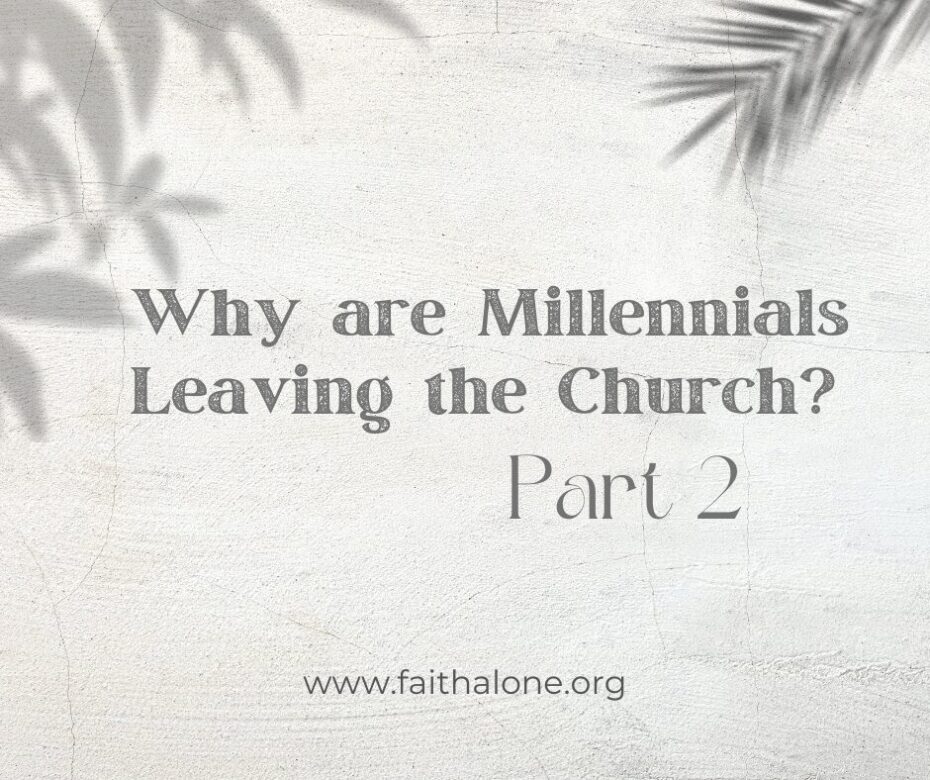A few months ago, I wrote a blog about why millennials are leaving the Church. You can check it out here. In that blog, I argued that while there are many reasons that younger people are leaving the Church, a common one is bad theology. I would like to offer another reason that I think is not addressed as often.
I saw a video recently of women who had deconstructed from the Church. Deconstruction is a term used to describe the postmodern movement, which strives to refute any claim of certainty found in a text, especially the Scripture. This young woman grew up in the Church but had left it. She was talking about C.S. Lewis, and how Evangelicals adore his writings. His series, The Chronicles of Narnia, is especially famous even in the secular world. She went on to discuss the fact that C.S. Lewis didn’t hold to the doctrine of eternal security. In fact, in the series The Chronicles of Narnia, one of the main characters, Susan, represents a believer who loses their salvation.
The woman in the video went on to talk about how confusing that was when she was growing up. She was taught eternal security, and yet the Church never spoke out against C.S. Lewis and his unbiblical views. When it came to one of their favorite writers, the Church remained silent due to compromise. This led the woman to question the Church and whether or not its claims of eternal security were even true. If the Church wasn’t willing to stand up for its convictions, why should she go to the Church for truth? Furthermore, since the Church didn’t stand up for its convictions when it came to issues of salvation, she was led to question it on other topics, and ultimately left the Church.
The Bible also speaks of the dangers of such compromise. For example, in Rev 2:12-17, the Lord addresses the Church at Pergamos. First, He praises it for its works in holding fast to His name and not denying the faith even during times of great persecution (v 13). However, there was an issue with the Church at Pergamos. The Church was compromising on doctrine. It allowed false doctrines, such as that of the Nicolaitans, to infiltrate the Church (vv 14-15). It should be noted that this Church knew the truth about the Lord and believed in Him for eternal life. However, it was not willing to stand up for the truth when it came to these other groups.
Due to its failure to be bold and speak out against such doctrines, the Lord instructs the church at Pergamos to repent. If it didn’t, He would come and fight against it with the sword of His mouth (v 16). Earlier in the passage, the Lord refers to the fact that He has a sharp two-edged sword (v 12). This refers to the Word of God (Heb 4:12) and emphasizes the importance of the Scriptures and doctrine. The implications are profound. If the Church won’t stand up for sound teaching, it will experience the consequences of that failure. This would include the loss of rewards at the Judgment Seat of Christ (v 17). The Church is not merely to believe the Word, it is to stand up for its convictions and proclaim it to others. This was especially important at Pergamos because some teachers had compromised with heresy.
We live in a day and age in which objective truth is seen as unloving, and those who proclaim it are labeled arrogant. To know you have eternal life and to have certainty on issues such as the content of saving faith will be seen as narrow-minded and overly dogmatic. If you speak out against someone like C.S. Lewis, who said a believer can lose eternal salvation, many, even within the Church, will see your actions as ungracious.
However, the Church’s failure to speak out resulted in that young woman’s deconstruction. Under the guise of compromise, the Church has caused the crumbling of the next generation’s spiritual education. Standing up for the truth and calling out heresy is the most loving thing we can do in a day and age when truth is being eclipsed by compromise.
When important issues such as eternal security or the content of saving faith arise today, many within the Church throw up their hands, and say “Who am I to say what God requires? Let’s just get along.” The importance of compromise, unity, and flexible views on doctrine are praised, while certainty and conviction are often denigrated. To make matters worse, those who do stand up for sound doctrine and speak out against false teachings are often demonized. The result is that people like the woman in the video fall away as collateral damage due to the Church’s failure to be bold in proclaiming the truth. Sometimes, younger generations leave the Church because of bad doctrine. Other times, however, they leave because there is no doctrine to be found.

